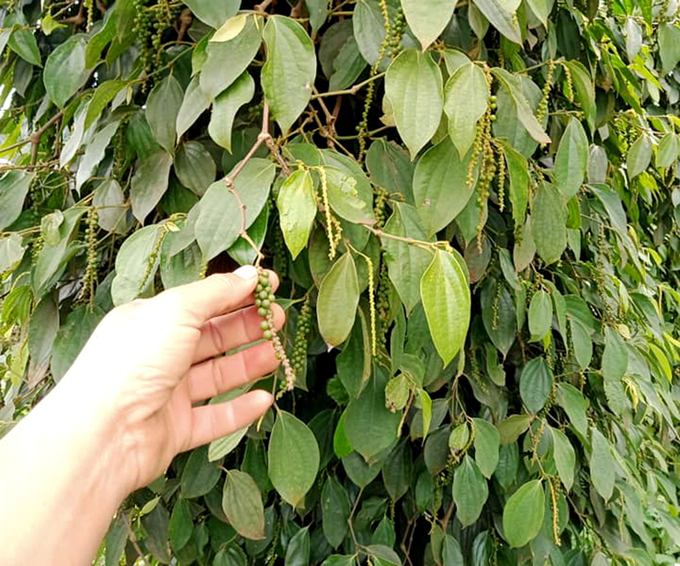May 18, 2025 | 08:58 GMT +7
May 18, 2025 | 08:58 GMT +7
Hotline: 0913.378.918
May 18, 2025 | 08:58 GMT +7
Hotline: 0913.378.918

Most of the pepper samples were contaminated with active ingredients for preventing pests and harmful fungi on pepper plants. Photo: Son Trang.
According to Mr. Viet Anh, Chief of Office of the Vietnam Pepper and Spice Association (VPSA), through analysis and testing of 284 pepper samples collected in the two years 2021-2022 by several export businesses and laboratories lab, the number of models that do not meet the EU's MRL (minimum residue limit) regulations is quite large. Specifically, 38 active ingredients were detected in these samples. The total frequency of active ingredients was 2,462; the entire value meeting EU MRL regulations was 2,051; the total value failed 411.
Active ingredients detected with high frequency include Chlorpyrifos-ethyl (kills insects, termites, mosquitoes, worms), Cypermethrin (kills flies, mosquitoes, termites, ants, cockroaches), Metalaxyl/Metalaxyl-M (sum), Metalaxyl (fungicidal), Imidacloprid (kills insects and termites), Carbendazim (fungicidal), Fenobucarb (insecticide and pesticide), Propamocarb (fungicidal).
Most of the pepper samples were contaminated with active ingredients for preventing pests and harmful fungi on pepper plants. Some active ingredients, such as Carbendazim and Chlorpyrifos (-ethyl), have been banned but still appear in pepper. It is very worrying if people continue to use prohibited drugs to care for pepper.
With that situation, VPSA updated the EU MRL regulation lookup data with pepper on the association's website. In addition, VPSA is promoting the implementation of programs and projects related to responsible use of chemicals on pepper plants. With EU funding, VPSA is coordinating with IDH (Sustainable Trade Initiative) to implement a project to develop sustainable trade in the pepper industry for 2022-2023.
According to IDH, as of June 2023, there were ten businesses, cooperatives, and cooperative groups (THT) participating in the project, including Tran Chau, Haprosimex, Simexco, Vietspice, DK Commodity, Ptexim, Vinh Hiep, Binh Cooperative Minh, Nam Yang Cooperative and THT Safe Agricultural Products.
A total of nearly 5,000 farmers and cooperative officials participated in training on 12 GAP topics (good agricultural practices): landscape approach, sustainable production, good farming practices, conservation land, rational management and use of water resources, responsible use of agricultural chemicals, replanting techniques, intercropping and biodiversity conservation. The total area applied for after training reaches 5,000 hectares. From this area, 16,700 tonnes of pepper were obtained, of which the pepper output reached the allowable residue of 10,125 tonnes, accounting for 60.8%.
Dak Nong Farm Cooperative is considered one of the leading units in gathering and linking people to produce pepper in an organic, safe, and sustainable direction. The cooperative has 25 members, and the average pepper yield reaches 4.5 tonnes/ha, with some gardens reaching 6-7 tonnes/ha. The cooperative has created jobs for 6 - 15 workers with an income of about VND 10 million/month. Workers can access organic pepper production techniques, accumulating experience to apply to their family's production area.

Through analysis and testing of 284 pepper samples collected in 2021-2022 by several export businesses and laboratories lab, the number of models that do not meet the EU's MRL (minimum residue limit) regulations is quite large. Photo: Son Trang.
During its operation, the cooperative established a CS team (cross-checking team) to monitor the production process of households closely.
For cooperative members to master techniques and meet the strict requirements of the international market, Dak Nong Farm Cooperative regularly invites experts to speak, exchange experiences, and effectively guide farmers in pepper production. To date, 100% of members have approached and implemented organic pepper production for most of the family's area.
The project also coordinated with the Plant Protection Department, IDH, and VPSA to develop guidance and training documents in the Integrated Plant Health Program for pure and intercropped pepper in the Central Highlands region. Nearly 23,000 people used the pesticide lookup application developed by the Department of Plant Protection and IDH.
Within the framework of the project, 10/10 agricultural service teams (Agriteams) of businesses and cooperatives participating in the project have been established. The members of this team are elite, active, trained farmers; the team's mission will continue to provide agricultural services, consulting, and monitoring of the responsible use of chemicals by farmers.
With the progress of implementing the above activities, at the end of the project, there will be a basis to improve the lives of 10,000 pepper farming households in the Central Highlands and help at least ten businesses, Pepper production, and processing cooperatives increase sustainable output.
Translated by Ha Phuc

(VAN) In the face of counterfeit and imitation products, Khanh Hoa Salanganes Nest Company hopes for the prompt completion of the legal framework, strict enforcement against violations, and protection of the bird’s nest brand.

(VAN) Japan's efforts to lower the price of rice through the release of its stockpile may finally be making some progress, albeit at a snail's pace.

(VAN) U.S. tariffs are not only a 'shock', but also an opportunity for Vietnamese businesses to renew their mindset toward comprehensive development.

(VAN) As Bac Giang lychee enters the harvest season, Minister Do Duc Duy expects that the fruit will contribute greatly to agricultural exports due to standardized production and deep processing.

(VAN) Consumers have shown a preference for free-range eggs, but those farming systems are more vulnerable to biosecurity risks like bird flu.
/2025/05/09/5701-1-184335_301.jpg)
(VAN) Vietnam’s eel exports nearly doubled thanks to a mud-free farming model, opening up new prospects while still facing numerous barriers related to international standards.

(VAN) Minister Do Duc Duy warned that if production is not professionalized and supply chains are not transparent, the U.S. market could become a growth bottleneck.